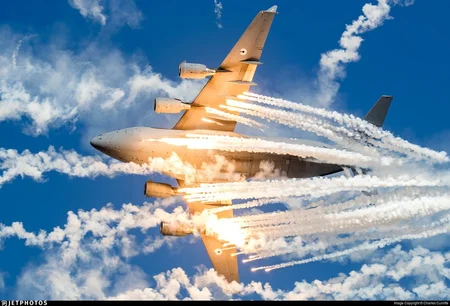The United Arab Emirates (UAE), which has been battling Iran backed Houthis in Yemen, has been landing at regular intervals its C-17 heavy transporters in Israel.
The Jerusalem Post is reporting that at least eight C-17 Globemaster heavy transport aircraft belonging to Abu Dhabi have landed in Israel in the past two weeks.
The C-17A Globemaster III with the UAE air force is a reliable US built workhorse that can lift heavy payloads and fly non-stop 2,400 nautical miles.
These planes have been landing at Israel Air Force’s Nevatim airbase in the southern part of the country. They take off after an hour of landing.
Three new F-35i "Adir" fighter jets touched down at Nevatim Airbase in southern Israel yesterday.
Equipped with state-of-the-art stealth technology, these aircraft will join the 116th "Lions of the South" Squadron and operate to keep Israel’s skies safe. 🇮🇱 pic.twitter.com/PkTy2pcB84
— Israel Defense Forces (@IDF) April 26, 2021
The daily speculates that these planes have been lifting equipment that is related to the defence contracts that Israel and the UAE have signed.
The military cooperation between the two is the direct follow-up of the Abraham Accords that have normalised ties between Israel and key Arab countries including the UAE, Bahrain and Oman—three aspirational and pragmatic countries that have been putting their resources for development by pragmatically engaging with the world.
Following the Abraham Accords, the UAE’s Minister of State for Defence Affairs Mohammed al-Bawardi and Israel’s Defence Minister Benny Gantz agreed to establish security ties between the two countries.
In January, a UAE subsidiary of Israel’s Elbit Systems was awarded a contract to supply airborne defence systems for Abu Dhabi’s tanker fleet of A330 Multi-Role Transport aircraft. Under the $ 53 million contract, Elbit Systems Emirates will supply Direct Infrared Countermeasures (“DIRCM”) and airborne Electronic Warfare (“EW”) systems for the tanker fleet of the UAE Air Force.
The UAE-Israel ties appear to have taken off after Abu Dhabi was subjected to a Houthi drone strike in which three people were killed.
Instead of seeking support from the Saudi led Gulf Cooperation Council (GCC), Abu Dhabi apparently knocked on Tel Aviv’s door.
Soon after the strike, Israel Prime Minister Naftali Bennett, “ordered the Israeli security establishment to provide their counterparts in the UAE with any assistance” that could help to protect against future attacks.
In April, SIBAT, the Israeli defence ministry military export arm said that Israel had exported $11.2 billion last year, but 7% of that contribution was by Arab countries who had signed the Abraham Accords.
The tie-ups in military equipment follows closed door intelligence-sharing between the two countries to counter the Iranian threat.
SIBAT’s head, Brig.-Gen. (res) Yair Kulas, said in early April that the ministry is working with the security industries in Israel to expand defence cooperation with Arab countries that have normalised ties with Israel.
“Looking ahead, shifting global priorities and partnerships such as the Abraham Accords create high demand for Israel’s cutting-edge technological systems,” Jerusalem Post quoted him as saying.
“If we look realistically at the coming years, there is great market potential and with cautious assessment, we expect to reach double-digits in the countries who signed the Abraham Accords in the coming years,” Kulas observed.
Also Read: In a gesture of cross culture celebration Israel president Herzog visits grand mosque in UAE.
Israel's outreach to the Arab world opportunities and pitfalls for regional security.




















